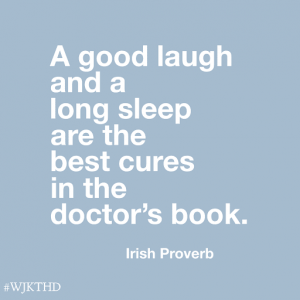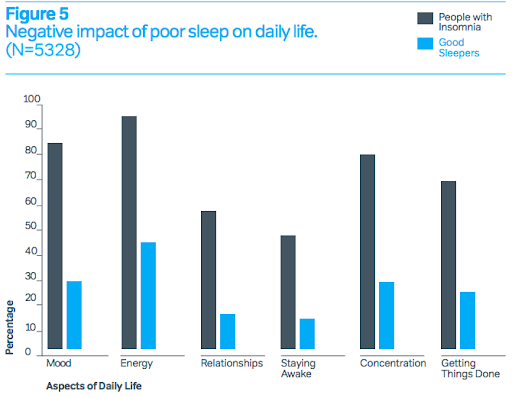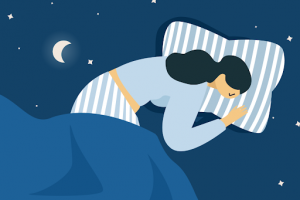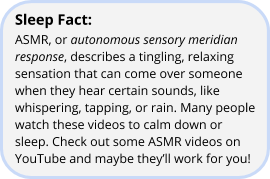The Importance of Sleep
Hello! I’m Dr. Zhang, Medical Director of Haven Elite Urgent Care, and this week I want to talk to you about the importance of sleep. During my time as an emergency physician, I’ve seen many ways in which sleep affects one’s physical and mental health. Now more than ever, with the stress of the pandemic and the threat that the coronavirus poses towards our health, we need to bring attention to the effect that sleep has on our bodies.
In this article, I’ll talk to you about what sleep is, why it’s necessary for humans, how much you should be getting, what happens when you don’t get enough, and how to get better rest.
What is Sleep and Why is it Important?
Just like eating and drinking, sleep is a basic human need. Sleep is necessary for good health and well-being. It’s important because it affects both our physical health and brain function.

Here are the ways sleep affects our physical health:
- The body repairs and rejuvenates itself. While we sleep, our cells are repairing the damage of the day from injuries, stress, UV rays, etc.
- It helps growth and development. Deep sleep triggers the body to release the hormone that promotes growth in children and young adults.
- It boosts the immune system. Sleep helps the body conserve energy and other resources that the immune system needs to attack any invaders.
Here are the ways sleep affects our brain function:
- It helps us process information and consolidate memories. While we sleep, our minds process information that we learned during the day and move memories from short-term to long-term. This video talks more about how sleep is connected to our learning ability.
- You feel more energized and alert the next day. After a good night’s sleep, our neurons are fully repaired and ready to begin another day.
How Much Sleep is Enough?
The amount of sleep you need varies throughout your life, depending on your age. This table is what the American Academy of Sleep Medicine (AASM) recommends.
|
Age |
Recommended Amount of Sleep |
| Infants aged 4-12 months |
12-16 hours a day (including naps) |
| Children aged 1-2 years | 11-14 hours a day (including naps) |
| Children aged 3-5 years | 10-13 hours a day (including naps) |
| Children aged 6-12 years | 9-12 hours a day |
| Teens aged 13-18 years | 8-10 hours a day |
| Adults aged 18 years or older | 7-8 hours a day |
When people’s schedules get busy, sleep often is the first thing they sacrifice. It’s extremely common for students to do this — my daughters are both in school, and they’ll always want to stay up late cramming the night before an exam! I remind them that working while they’re tired will only make it harder to focus and remember the information. Your mind and body will thank you if you make time for sleep!
I remind them that working while they’re tired will only make it harder to focus and remember the information. Your mind and body will thank you if you make time for sleep!
Sleep Deprivation and its Symptoms
Sleep deprivation occurs when you consistently don’t get enough sleep. Keep in mind, sleep loss can add up! Even just losing 1-2 hours a night for several nights can make your body feel like you haven’t slept at all for a day or two. Sleep deprivation affects both your physical health as well as your mental and emotional health.

PSYCHOLOGICAL EFFECTS
- Harder to concentrate
Sleep-deprived people are less productive. They take longer to complete tasks, make more mistakes, and have a slower reaction time. Several studies have actually shown that sleep-deprived people who are tested with a driving simulator perform as badly as or worse than those who are drunk.
- More stressed
When you don’t get enough sleep, your blood pressure increases and your body produces more stress hormones, causing you to feel stressed more easily.
- Depression
According to studies done by the Mental Health Foundation, the people in the survey that didn’t get enough sleep were four times more likely to have relationship problems and 3 times more likely to be depressed.

PHYSICAL EFFECTS
- Problems with your heart and blood vessels
Sleep helps repair your heart and blood vessels. Being sleep-deprived puts you at higher risk for high blood pressure, heart disease, kidney disease, stroke, and diabetes.
- Obesity
During sleep, your body balances the hormones that make you hungry and full. Without sleep, you feel hungrier than you usually do. Also, your blood sugar level becomes abnormally high.
- Weaker immune system
When you don’t get enough sleep, your body doesn’t produce as many cytokines, which help fight infections. With the threat of COVID, it’s super important to get a healthy amount of sleep so that your body doesn’t take a longer time to recover from illness!
How to Get Good Sleep
Getting good sleep requires good bedtime habits. Here is a list of things I recommend trying to get better sleep:


- Follow a regular sleep schedule — even on weekends — to keep your body clock’s internal rhythm stable.
- Keep your bedroom quiet, cool, and dark.
- Avoid caffeine, alcohol, and nicotine in the late afternoon and night.
- Get good exercise during the day.
- Avoid bright light, like TVs or phone screens, around an hour before bed.
- Take a warm bath or shower or use other relaxation techniques before you sleep. For some great, relaxing meditation-videos, click this link to our other blog here!
- Limit napping time or take naps earlier in the afternoon.
Let’s Review: The Importance of Sleep and How to Get It
During this pandemic, it’s important for you to take care of your health as best as you can, and that includes getting good sleep. Not only does sleep boost your immune system and keep your body running smoothly, but it is also healing for the mind. I hope this article has taught you to value sleep a little more and helped you discover some ways to sleep better.
Sweet dreams!
– Dr. Zhang
